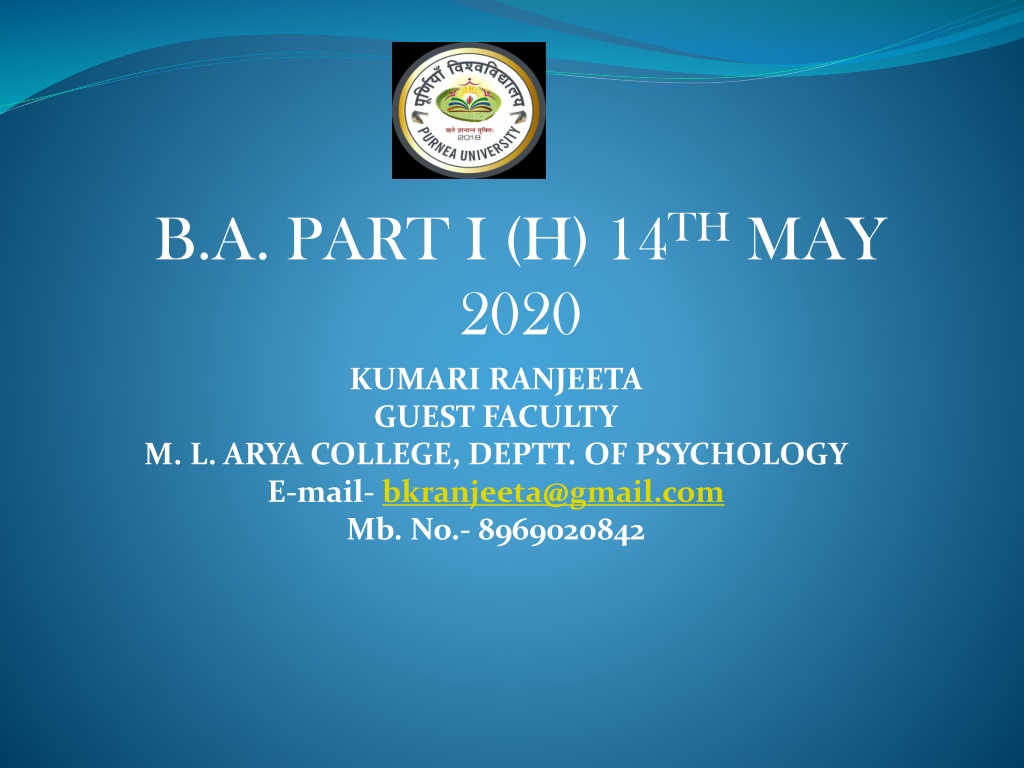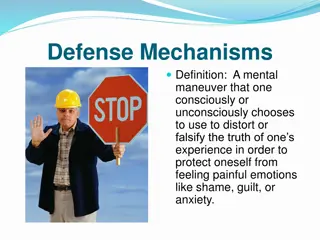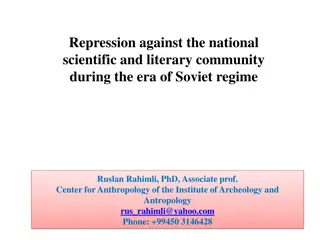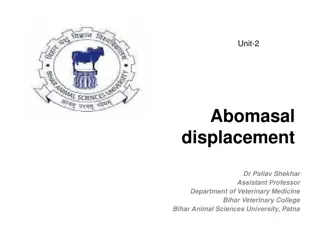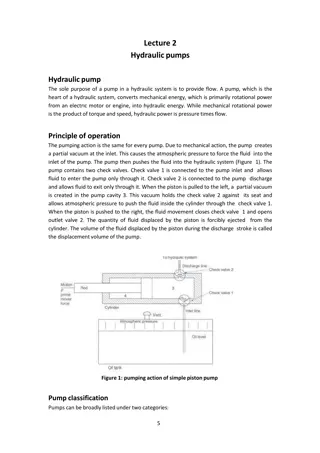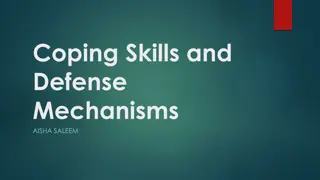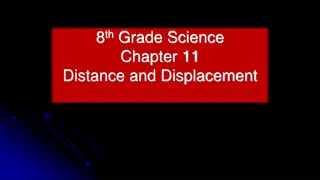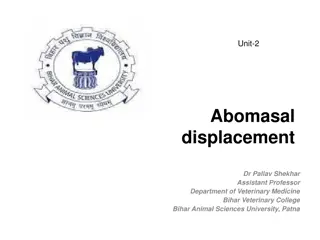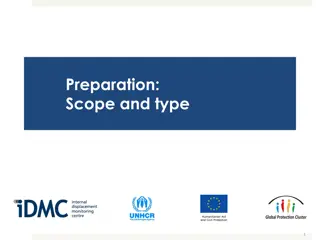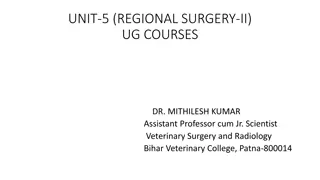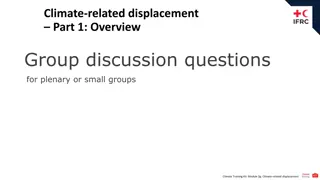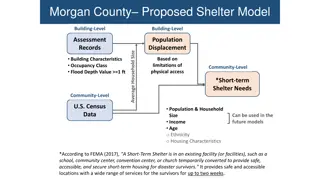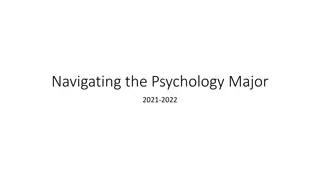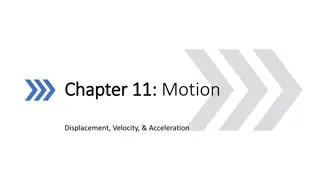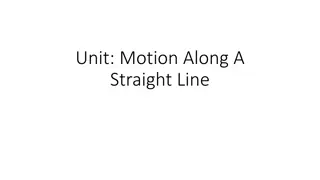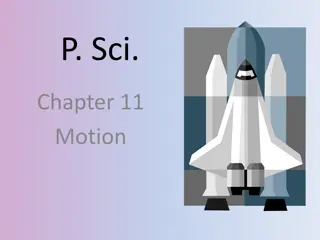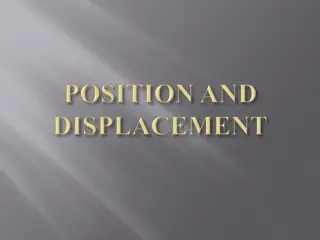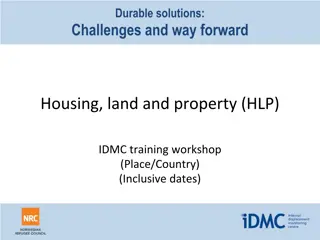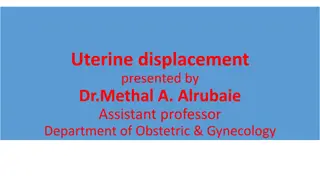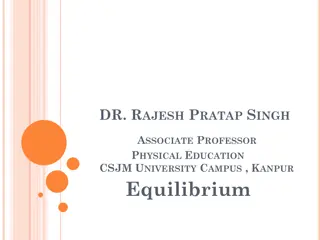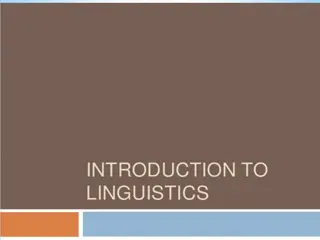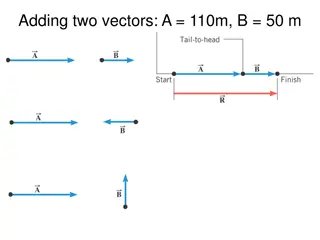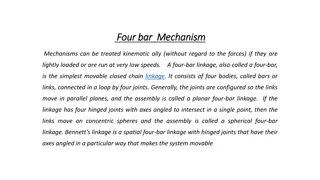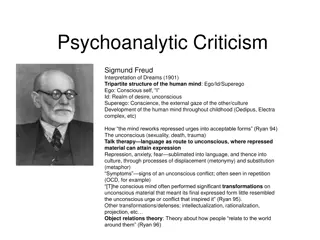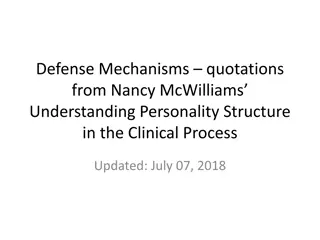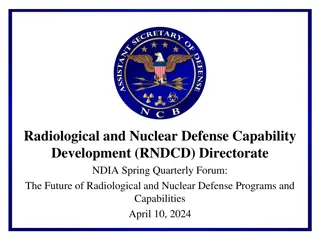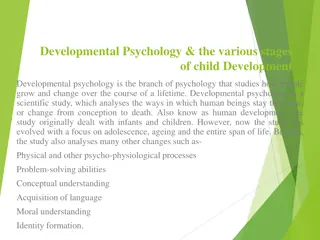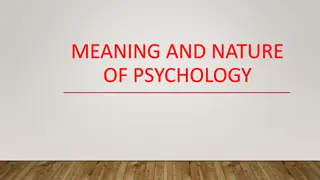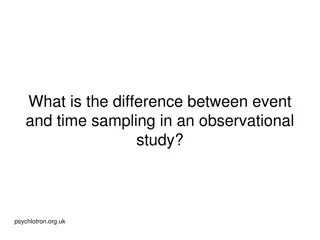Defense Mechanisms in Psychology: Understanding Repression, Displacement, Intellectualization, Rationalization
Defense mechanisms play a crucial role in how individuals cope with stress and anxiety. This text delves into key defense mechanisms such as repression, displacement, intellectualization, and rationalization. These mechanisms help individuals manage unacceptable thoughts, feelings, and impulses by redirecting or reinterpreting them in different ways. Understanding how these mechanisms operate can provide insights into human behavior and emotional responses.
Uploaded on Oct 09, 2024 | 0 Views
Download Presentation

Please find below an Image/Link to download the presentation.
The content on the website is provided AS IS for your information and personal use only. It may not be sold, licensed, or shared on other websites without obtaining consent from the author. Download presentation by click this link. If you encounter any issues during the download, it is possible that the publisher has removed the file from their server.
E N D
Presentation Transcript
B.A. PART I (H) 14TH MAY 2020 KUMARI RANJEETA GUEST FACULTY M. L. ARYA COLLEGE, DEPTT. OF PSYCHOLOGY E-mail- bkranjeeta@gmail.com Mb. No.- 8969020842
14 MAY 2020 B.A. PART I (H) PAPER III, UNIT II (STRESS PROBLEM OF ADJUSTMENT) EGO DEFENCE MECHANISM II Less Primitive, More Mature Defense Mechanisms Less primitive defense mechanisms are a step up from the primitive defense mechanisms in the previous section. Many people employ these defenses as adults, and while they work okay for many, they are not ideal ways of dealing with our feelings, stress and anxiety. If you recognize yourself using a few of these, don t feel bad everybody does. 8. Repression Repression is the unconscious blocking of unacceptable thoughts, feelings and impulses.
14 MAY 2020 B.A. PART I (H) PAPER III, UNIT II (STRESS PROBLEM OF ADJUSTMENT) The key to repression is that people do it unconsciously, so they often have very little control over it. Repressed memories are memories that have been unconsciously blocked from access or view. But because memory is very malleable and ever-changing, it is not like playing back a DVD of your life. The DVD has been filtered and even altered by your life experiences, even by what you ve read or viewed. 9. Displacement Displacement is the redirecting of thoughts feelings and impulses directed at one person or object, but taken out upon another person or object. People often use displacement when they cannot express their feelings in a safe manner to the person they are directed at.
14 MAY 2020 B.A. PART I (H) PAPER III, UNIT II (STRESS PROBLEM OF ADJUSTMENT) The classic example is the man who gets angry at his boss, but can t express his anger to his boss for fear of being fired. He instead comes home and kicks the dog or starts an argument with his wife. The man is redirecting his anger from his boss to his dog or wife. Naturally, this is a pretty ineffective defense mechanism, because while the anger finds a route for expression, it s misapplication to other harmless people or objects will cause additional problems for most people. 10. Intellectualization When a person intellectualizes, they shut down all of their emotions and approach a situation solely from a rational standpoint especially when the expression of emotions would be appropriate.
14 MAY 2020 B.A. PART I (H) PAPER III, UNIT II (STRESS PROBLEM OF ADJUSTMENT) Intellectualization is the overemphasis on thinking when confronted with an unacceptable impulse, situation, or behavior without employing any emotions whatsoever to help mediate and place the thoughts into an emotional, human context 11. Rationalization Rationalization is putting something into a different light or offering a different explanation for one s perceptions or behaviors in the face of a changing reality. For instance, a woman who starts dating a man she really, really likes and thinks the world of is suddenly dumped by the man for no reason. She re-imagines the situation in her mind with the thought, I suspected he was a loser all along.
14 MAY 2020 B.A. PART I (H) PAPER III, UNIT II (STRESS PROBLEM OF ADJUSTMENT) 12. Undoing Undoing is the attempt to take back an unconscious behavior or thought that is unacceptable or hurtful. For instance, after realizing you just insulted your significant other unintentionally, you might spend then next hour praising their beauty, charm and intellect. By undoing the previous action, the person is attempting to counteract the damage done by the original comment, hoping the two will balance one another out.
14 MAY 2020 B.A. PART I (H) PAPER III, UNIT II (STRESS PROBLEM OF ADJUSTMENT) Mature Defense Mechanisms Mature defense mechanisms are often the most constructive and helpful to most adults, but may require practice and effort to put into daily use. While primitive defense mechanisms do little to try and resolve underlying issues or problems, mature defenses are more focused on helping a person be a more constructive component of their environment. People with more mature defenses tend to be more at peace with themselves and those around them.
14 MAY 2020 B.A. PART I (H) PAPER III, UNIT II (STRESS PROBLEM OF ADJUSTMENT) 13. Sublimation Sublimation is simply the channeling of unacceptable impulses, thoughts and emotions into more acceptable ones. For instance, when a person has sexual impulses they would like not to act upon, they may instead focus on rigorous exercise. Refocusing such unacceptable or harmful impulses into productive use helps a person channel energy that otherwise would be lost or used in a manner that might cause the person more anxiety.
14 MAY 2020 B.A. PART I (H) PAPER III, UNIT II (STRESS PROBLEM OF ADJUSTMENT) 14. Compensation Compensation is a process of psychologically counterbalancing perceived weaknesses by emphasizing strength in other arenas. By emphasizing and focusing on one s strengths, a person is recognizing they cannot be strong at all things and in all areas in their lives. For instance, when a person says, I may not know how to cook, but I can sure do the dishes!, they re trying to compensate for their lack of cooking skills by emphasizing their cleaning skills instead. When done appropriately and not in an attempt to over-compensate, compensation is defense mechanism that helps reinforce a person s self- esteem and self-image.
14 MAY 2020 B.A. PART I (H) PAPER III, UNIT II (STRESS PROBLEM OF ADJUSTMENT) 15. Assertiveness Assertiveness is the emphasis of a person s needs or thoughts in a manner that is respectful, direct and firm. Communication styles exist on a continuum, ranging from passive to aggressive, with assertiveness falling neatly in- between. People who are passive and communicate in a passive manner tend to be good listeners, but rarely speak up for themselves or their own needs in a relationship. Remember, defense mechanisms are most often learned behaviors, most of which we learned during childhood.
